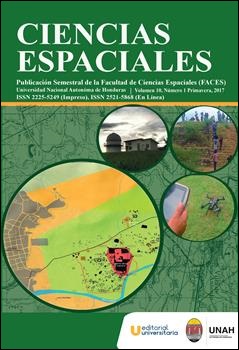Multisensor Exploration for the Detection of Ground Anomalies and Analysis Spectral On and Low Surface
DOI:
https://doi.org/10.5377/ce.v10i1.5723Keywords:
Multisensor, 3D three-dimensional, Anomaly Detection, Location Evidence, Scenario.Abstract
In recent years, different organizations and research groups have contributed to the development of multi-sensor systems focused to several applications in the civil segment with great potential in the three-dimensional land exploration in the sense of the evidence location and the detection of the buried or semi-buried material remains. These designs allow us a complete inspection in the range of the electromagnetic spectrum of visible and near-infrared thermal infrared, enabling its installation in aerial or ground platforms. The system provides navigation and guidance devices (GNSS/INS) which enables direct and accurate georeferencing of the information extracted. The exploration proposal is made by an aerial laser radar (Lídar) to obtain 3D point clouds, three visible frame high-resolution cameras oriented for a confgurable multi-angle pointing, a millimeter-wave radio-altimeter and a head Gyro-stabilized with double multispectral camera in the visible, near and thermal infrared (VNIR-TIR) spectrum. The information acquired on different scenarios is automatically analyzed by remote sensing methods and algorithms. Among them, we propose a new image spectrometry detection technique based on small infrared target based on the search of the best projection of outliers on a thermal background. This method provides results that are highly correlated with different entities for the detection of potential targets and locate evidences in scientifc research in different scenarios.Downloads
Download data is not yet available.
Abstract
1085
1085
PDF (Español (España)) 1203
Downloads
Published
2018-03-22
How to Cite
Rejas, J. G., Farjas, M., & Rejas, J. (2018). Multisensor Exploration for the Detection of Ground Anomalies and Analysis Spectral On and Low Surface. Ciencias Espaciales, 10(1), 5–21. https://doi.org/10.5377/ce.v10i1.5723
Issue
Section
Editorial




